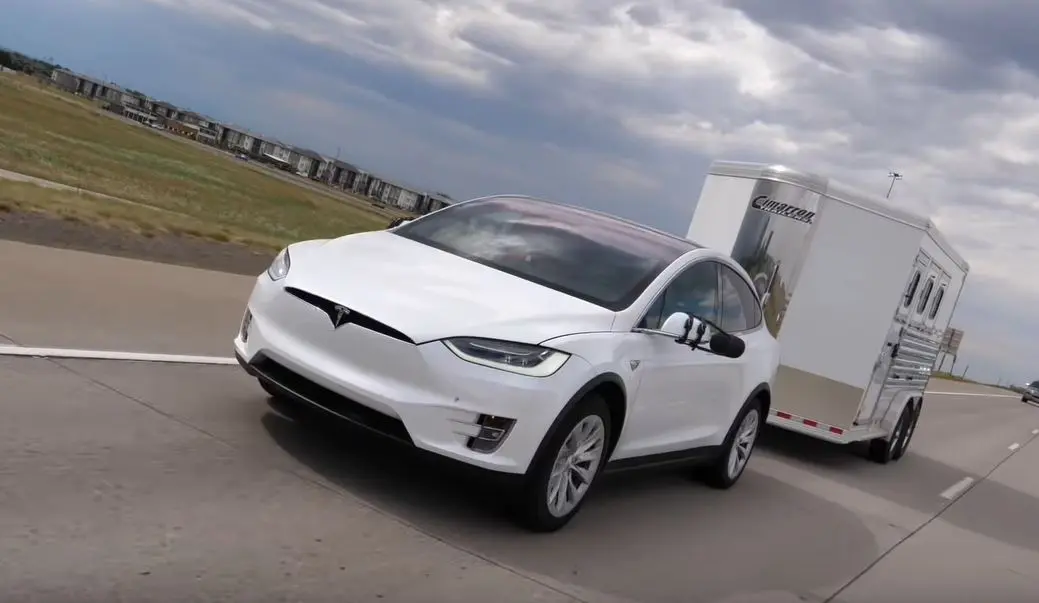The Real Tesla Cybertruck Killer Is Not A Pickup Truck But A Trailer Instead

The real Cybertruck Killer could be a trailer instead of another electric or ICE pickup truck. During the testing of the towing capacity of a Tesla Model X Long Range, the results raised concerns over the capabilities of the upcoming Tesla Cybertruck.
The testing was done by The Fast Lane Truck, a truck oriented content creator and YouTube channel. They tested the Model X Long Range to showcase that electric vehicles lose battery range quite rapidly when towing any kind of electric load.
“There are two serious problems that very few people are discussing and no electric pickup manufacturer addressed this directly quite yet,” said the presenter.
The two problems include the mystery around the towing performance of EVs and electric pickup trucks in particular, in terms of battery range and their off-road performance.
The team of The Fast Lane Truck used the Tesla Model X Long Range as their test vehicle because it has the most towing capacity (5,000 pounds) of any electric car in production.
Here’s how the Tesla Model X Performed.
Could the Real Tesla Cybertruck Killer Be Towing Range?
Before we go ahead and analyze the video, I’d like to say that the Tesla Model X is not comparable to a Tesla Cybertruck, Both have different platforms and entirely distinct battery packs.
With that said, let’s see what we have here.
In the beginning, the Model X goes around a 30-mile stretch twice, once without the trailer (unladen) and once with (laden).
During the first time, the Tesla Model X exceeds the EPA rating given by the manufacturer, the team themselves confirms this. However, while towing a trailer, things become a little mushy.
The Model X, while carrying a 4,400 pounds 1995 kg trailer, returned a consumption rate of 922 wh/mile. In contrast, the Model X consumed only 274 wh/mile while going unladen.
You can get the Miles Per Hour equivalent of 922 Wh/mile by dividing it with 36,650, which is the amount of energy in 1 gallon of gasoline.
922 Wh/mile roughly equals 40 miles per gallon. Now do keep in mind that this figure is still more than what most pickup trucks deliver. It seems less for an electric vehicle because of the size of the battery pack.
The Tesla Model X consumed 33% battery to travel around 30 something kilometers while towing. This gives it an average consumption of 1% battery for 1 mile traveled.
The next test took place of Ike Gauntlet, which is supposed to be the toughest test of towing for pickup trucks. The Tesla Model X, in this case, consumed a maximum of 1828 wh/mile, which is equivalent to 20 mpg.
This is the range that most pickup trucks deliver within the city or on the highway. But they have a large 30-gallon fuel tank, which can be refilled in a matter of minutes and puts them at an advantage over an electric vehicle.
Also, keep in mind that the Tesla Model X towed the trailer without any kind of stress. The electric motors were putting down a lot of power yet remained cool, the testing team confirmed that.
Also, the camera crew following the Model X had a hard time keeping up with it during an uphill section of the road. Despite the Tesla towing the trailer, it sped away from the Dodge Rebel Rouser Project truck with ease.
The same happened in the earlier case as well. Tesla Model X was easily able to tow heavy amounts of weight but couldn’t deliver on the battery range.
The third test involved pulling a 2,200 pound or 997 kg trailer. In this test, The Model X consumed 60% of battery to travel 82 miles, which is more than the first case.
However, the crew had plans to travel a really long distance with their camping trailer and Model X couldn’t deliver on that front.
The third test was an off-road test for the Tesla Model X. It was fitted with a bigger tire to go off-road and so it did. But according to the testing crew, the battery range suffered a lot in this case as well.
Tesla Cybertruck Killer: Tesla Model X Can Tow
Electric vehicles deliver more efficiency when towing as compared to conventional pickup trucks. Because 922 wh/mile or 40 mile is still greater than 24 mpg which a V8 Ford-F150 delivers on the highway.
At the end of the testing, the crew suggested a number of solutions to this problem of electric vehicles. According to them, the availability of fast-charging stations is crucial to towing heavy-duty loads for long hauls.
They also recommended the use of a trailer that could help the electric pickup truck in towing and recharging. I doubt that a solution like this would be feasible and most important of all, scalable, but I am more than happy to be proven wrong.
As I mentioned earlier, the Tesla Model X is not designed for towing and handling heavy-duty loads.
It is able to tow a huge amount of weight because it has powerful electric motors but it isn’t able to do so as efficiently as a dedicated electric pickup truck would.
Such heavy towing is in no way a “Tesla Cybertruck killer.”
Also Read:Tesla Model 3 Charged Using A Ford F-150 Raptor Delivers More MPG Than The Latter






